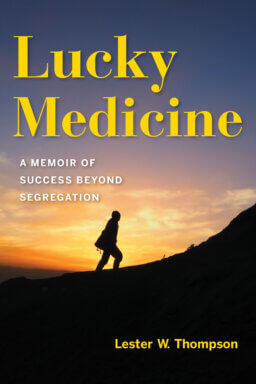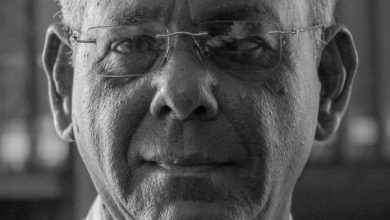When We Were Innocent

“Lucky Medicine” by Lester W. Thompson
c.2023,
Well House Books,
Indiana University Press
$24.00
196 pages
It didn’t arrived in a package.
It wasn’t wrapped in fancy paper, it didn’t arrive with cake or candles. And yet, the gift you got, that thing that someone gave you was better than anything that could’ve come in a pretty box. It was bigger than you ever expected. As in the new memoir, “Lucky Medicine” by Lester W. Thompson, the gift was a life-changer.
Born and raised in Indianapolis, Lester Thompson grew up with “rules” that his Southern-born parents instilled in him all his life. Even though Jim Crow racism wasn’t entrenched in the North like it was in the South, such rules were “the frame of reference.”
And that lent mystery to a very curious relationship Thompson’s father had with a white Jewish man, a Mr. Goodman. Cal Thompson cut Goodman’s hair in the privacy of Goodman’s home; Thompson sometimes accompanied his father there but he never fully understood the friendship between the two men. He says “It didn’t occur to me to wonder…”
When he was thirteen, he learned the truth: he was named after Goodman, who was his father’s closest friend. Furthermore, Goodman was Thompson’s godfather and he’d made a vow to pay for Thompson’s entire college education.
That he was going to be a doctor someday was another thing Thompson had known all his life. His father, an authoritarian alcoholic, never left any room to question it. And so, after high school graduation, Thompson headed to IU in Bloomington, Indiana.
It was an eye-opener, in many ways.
Lester W. Thompson author of “Lucky Medicine.”
An only child, Thompson had to learn how to share. He had to learn to live with white people next door, and how to study for classes that seemed impossible to ace. He fell in love, and fell again. And he watched the world change as the Civil Rights Movement began.
“I will never know what prompted Mr. Goodman to make his gift,” Thompson says. “but in the end, I suppose, all that matters is that he did.”
Sometimes, change can come with a big ka-BOOM. Other times, it sneaks in the back door and sits quietly. That mixture’s what you get with this unique memoir, “Lucky Medicine.”
Unique because while racism figures into author Lester W. Thompson’s story, it’s not a very big part, considering the mid-last-century setting. The Movement is barely a blip on the radar; only a handful of troubles with white people are mentioned, and they’re not belabored. So racism is in this book, but only at whisper-level.
Instead, Thompson focuses on his relatively insulated life, his parents and friends, his studies, and the mysterious, still-unsolved relationship his father had with Goodman. And that’s where this story glows: Thompson’s tale is nostalgic and mundane. It’s not overly-dramatic. It doesn’t shout or beg for attention. It’s just warm and happily, wonderfully, ordinary.
Be aware before you share this book with an elder that there are four-letter words in here and a rather eyebrow-raising, too-much-information bedroom scene inside. If you can handle that, though, “Lucky Medicine” is a one-of-a-kind gift.




